An Analysis of Jihad's Relationship with the Five Pillars of Islam
VerifiedAdded on 2020/07/22
|7
|2091
|570
Essay
AI Summary
This essay delves into the concept of Jihad within the framework of the Five Pillars of Islam, exploring its multifaceted interpretations and significance. The essay begins by introducing the Five Pillars—Shahada (faith), Salat (prayer), Zakat (charity), Sawm (fasting), and Hajj (pilgrimage)—as the foundational practices of Islam. It then examines Jihad, often translated as 'struggle,' in its various forms, including internal spiritual struggle, the striving to build a just society, and, in certain contexts, armed defense. The analysis highlights the relationship between Jihad and the Five Pillars, emphasizing how Jihad can be viewed as a form of dedication to the principles embodied by the Pillars, such as the sacrifices made during Hajj and the ongoing struggle to uphold Islamic values. The essay concludes by asserting that Jihad is connected to the Five Pillars of Islam. It also emphasizes that Jihad is not always related to war and violence, but also interlinked with the own security and security of religion.
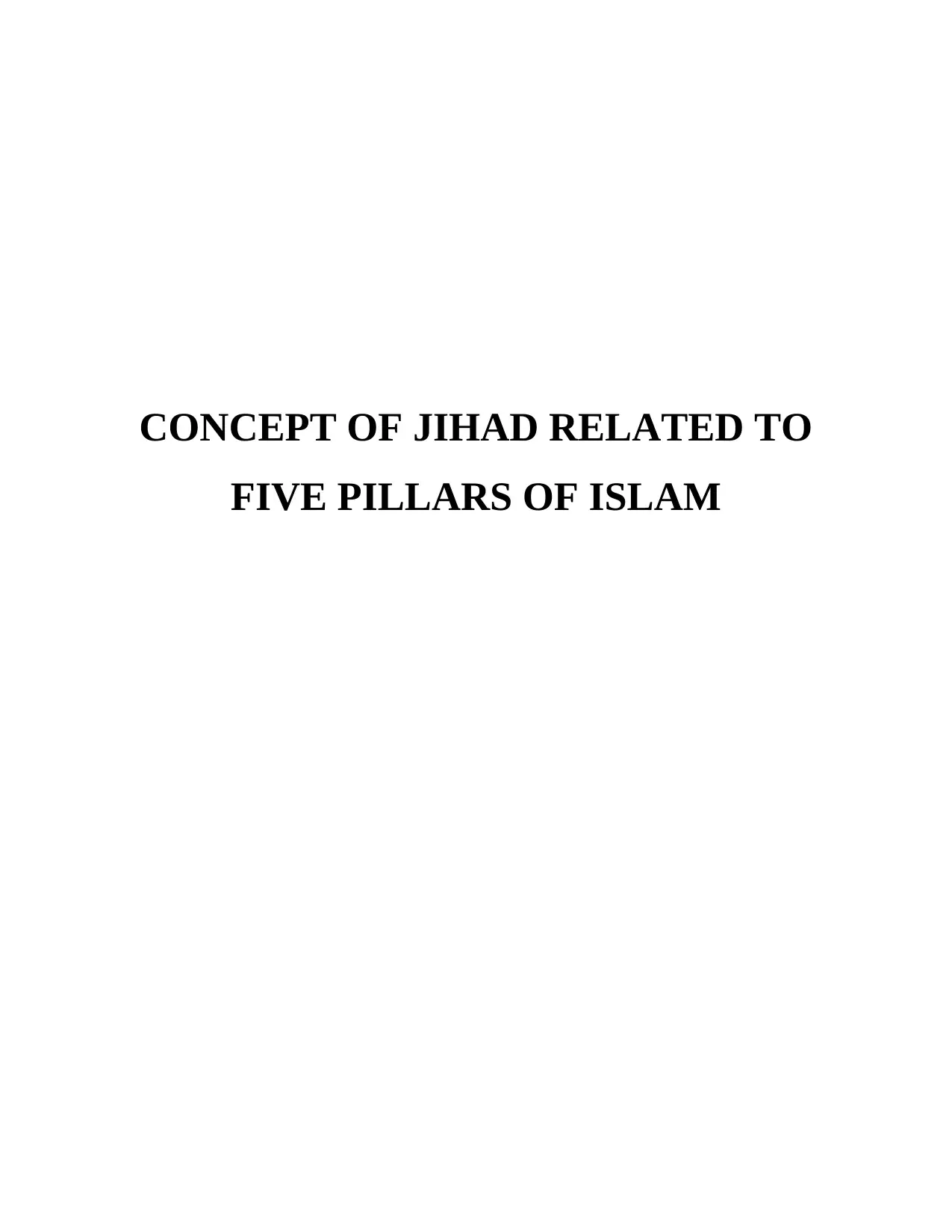
CONCEPT OF JIHAD RELATED TO
FIVE PILLARS OF ISLAM
FIVE PILLARS OF ISLAM
Paraphrase This Document
Need a fresh take? Get an instant paraphrase of this document with our AI Paraphraser

Table of Contents
INTRODUCTION ..........................................................................................................................1
MAIN BODY...................................................................................................................................1
CONCLUSION................................................................................................................................4
REFERENCES................................................................................................................................5
INTRODUCTION ..........................................................................................................................1
MAIN BODY...................................................................................................................................1
CONCLUSION................................................................................................................................4
REFERENCES................................................................................................................................5
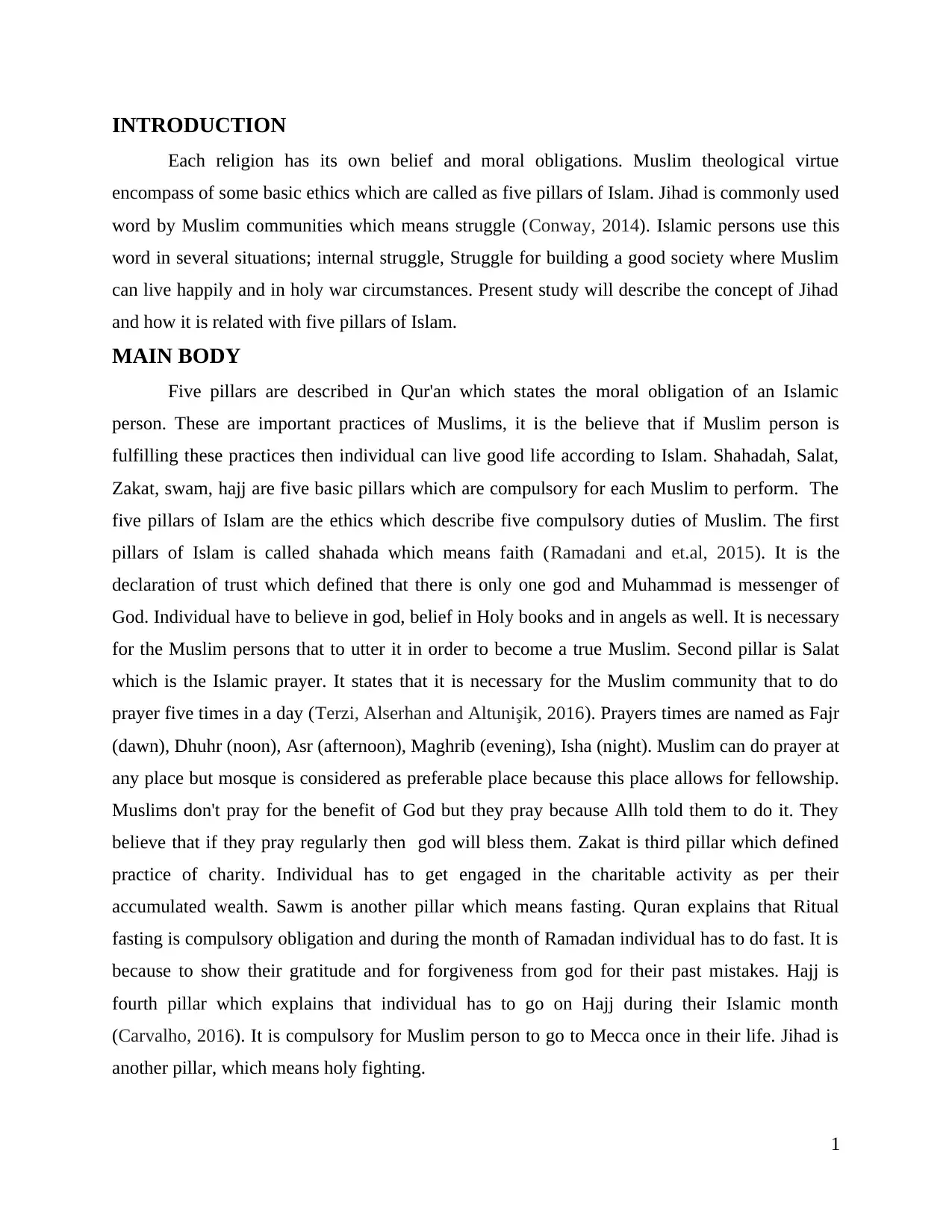
INTRODUCTION
Each religion has its own belief and moral obligations. Muslim theological virtue
encompass of some basic ethics which are called as five pillars of Islam. Jihad is commonly used
word by Muslim communities which means struggle (Conway, 2014). Islamic persons use this
word in several situations; internal struggle, Struggle for building a good society where Muslim
can live happily and in holy war circumstances. Present study will describe the concept of Jihad
and how it is related with five pillars of Islam.
MAIN BODY
Five pillars are described in Qur'an which states the moral obligation of an Islamic
person. These are important practices of Muslims, it is the believe that if Muslim person is
fulfilling these practices then individual can live good life according to Islam. Shahadah, Salat,
Zakat, swam, hajj are five basic pillars which are compulsory for each Muslim to perform. The
five pillars of Islam are the ethics which describe five compulsory duties of Muslim. The first
pillars of Islam is called shahada which means faith (Ramadani and et.al, 2015). It is the
declaration of trust which defined that there is only one god and Muhammad is messenger of
God. Individual have to believe in god, belief in Holy books and in angels as well. It is necessary
for the Muslim persons that to utter it in order to become a true Muslim. Second pillar is Salat
which is the Islamic prayer. It states that it is necessary for the Muslim community that to do
prayer five times in a day (Terzi, Alserhan and Altunişik, 2016). Prayers times are named as Fajr
(dawn), Dhuhr (noon), Asr (afternoon), Maghrib (evening), Isha (night). Muslim can do prayer at
any place but mosque is considered as preferable place because this place allows for fellowship.
Muslims don't pray for the benefit of God but they pray because Allh told them to do it. They
believe that if they pray regularly then god will bless them. Zakat is third pillar which defined
practice of charity. Individual has to get engaged in the charitable activity as per their
accumulated wealth. Sawm is another pillar which means fasting. Quran explains that Ritual
fasting is compulsory obligation and during the month of Ramadan individual has to do fast. It is
because to show their gratitude and for forgiveness from god for their past mistakes. Hajj is
fourth pillar which explains that individual has to go on Hajj during their Islamic month
(Carvalho, 2016). It is compulsory for Muslim person to go to Mecca once in their life. Jihad is
another pillar, which means holy fighting.
1
Each religion has its own belief and moral obligations. Muslim theological virtue
encompass of some basic ethics which are called as five pillars of Islam. Jihad is commonly used
word by Muslim communities which means struggle (Conway, 2014). Islamic persons use this
word in several situations; internal struggle, Struggle for building a good society where Muslim
can live happily and in holy war circumstances. Present study will describe the concept of Jihad
and how it is related with five pillars of Islam.
MAIN BODY
Five pillars are described in Qur'an which states the moral obligation of an Islamic
person. These are important practices of Muslims, it is the believe that if Muslim person is
fulfilling these practices then individual can live good life according to Islam. Shahadah, Salat,
Zakat, swam, hajj are five basic pillars which are compulsory for each Muslim to perform. The
five pillars of Islam are the ethics which describe five compulsory duties of Muslim. The first
pillars of Islam is called shahada which means faith (Ramadani and et.al, 2015). It is the
declaration of trust which defined that there is only one god and Muhammad is messenger of
God. Individual have to believe in god, belief in Holy books and in angels as well. It is necessary
for the Muslim persons that to utter it in order to become a true Muslim. Second pillar is Salat
which is the Islamic prayer. It states that it is necessary for the Muslim community that to do
prayer five times in a day (Terzi, Alserhan and Altunişik, 2016). Prayers times are named as Fajr
(dawn), Dhuhr (noon), Asr (afternoon), Maghrib (evening), Isha (night). Muslim can do prayer at
any place but mosque is considered as preferable place because this place allows for fellowship.
Muslims don't pray for the benefit of God but they pray because Allh told them to do it. They
believe that if they pray regularly then god will bless them. Zakat is third pillar which defined
practice of charity. Individual has to get engaged in the charitable activity as per their
accumulated wealth. Sawm is another pillar which means fasting. Quran explains that Ritual
fasting is compulsory obligation and during the month of Ramadan individual has to do fast. It is
because to show their gratitude and for forgiveness from god for their past mistakes. Hajj is
fourth pillar which explains that individual has to go on Hajj during their Islamic month
(Carvalho, 2016). It is compulsory for Muslim person to go to Mecca once in their life. Jihad is
another pillar, which means holy fighting.
1
⊘ This is a preview!⊘
Do you want full access?
Subscribe today to unlock all pages.

Trusted by 1+ million students worldwide
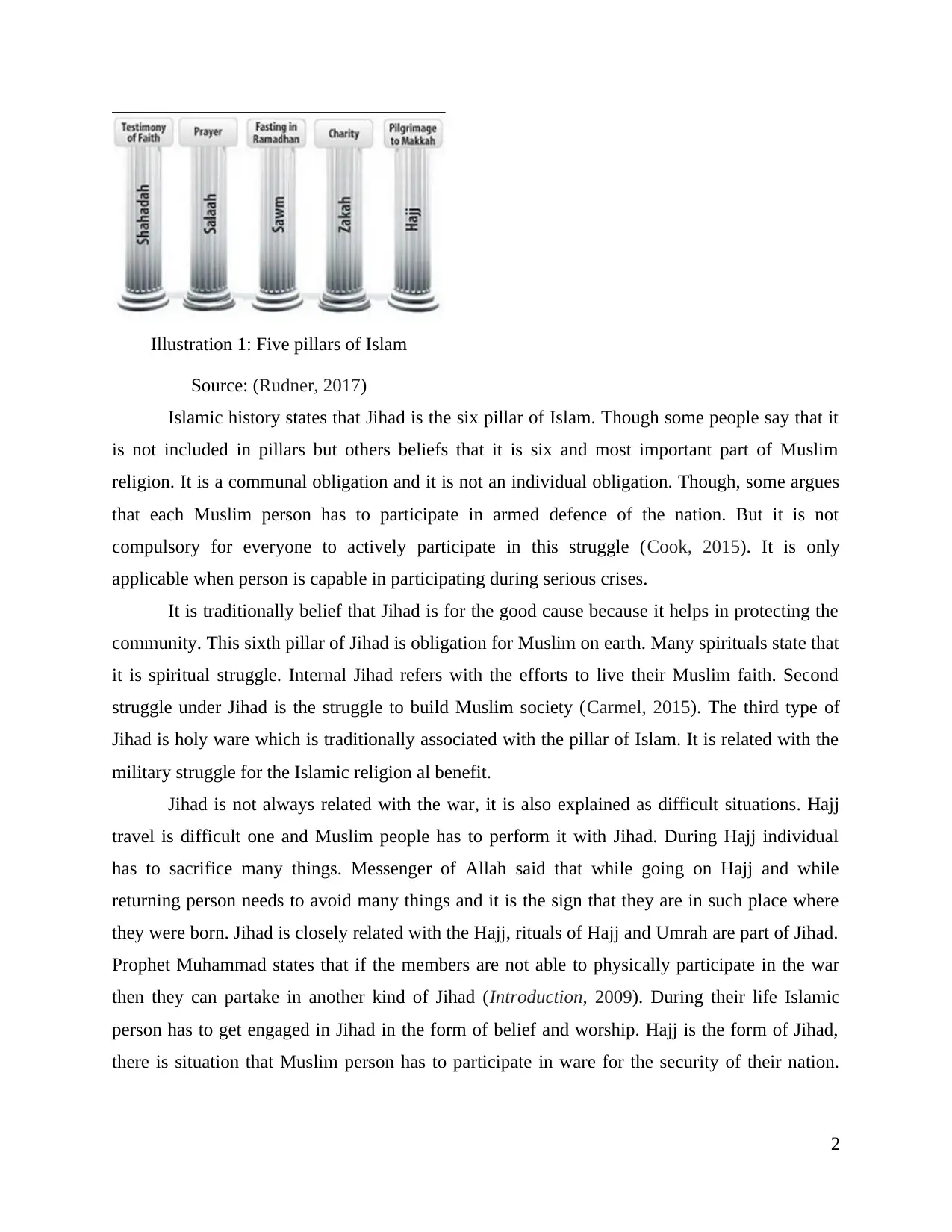
Illustration 1: Five pillars of Islam
Source: (Rudner, 2017)
Islamic history states that Jihad is the six pillar of Islam. Though some people say that it
is not included in pillars but others beliefs that it is six and most important part of Muslim
religion. It is a communal obligation and it is not an individual obligation. Though, some argues
that each Muslim person has to participate in armed defence of the nation. But it is not
compulsory for everyone to actively participate in this struggle (Cook, 2015). It is only
applicable when person is capable in participating during serious crises.
It is traditionally belief that Jihad is for the good cause because it helps in protecting the
community. This sixth pillar of Jihad is obligation for Muslim on earth. Many spirituals state that
it is spiritual struggle. Internal Jihad refers with the efforts to live their Muslim faith. Second
struggle under Jihad is the struggle to build Muslim society (Carmel, 2015). The third type of
Jihad is holy ware which is traditionally associated with the pillar of Islam. It is related with the
military struggle for the Islamic religion al benefit.
Jihad is not always related with the war, it is also explained as difficult situations. Hajj
travel is difficult one and Muslim people has to perform it with Jihad. During Hajj individual
has to sacrifice many things. Messenger of Allah said that while going on Hajj and while
returning person needs to avoid many things and it is the sign that they are in such place where
they were born. Jihad is closely related with the Hajj, rituals of Hajj and Umrah are part of Jihad.
Prophet Muhammad states that if the members are not able to physically participate in the war
then they can partake in another kind of Jihad (Introduction, 2009). During their life Islamic
person has to get engaged in Jihad in the form of belief and worship. Hajj is the form of Jihad,
there is situation that Muslim person has to participate in ware for the security of their nation.
2
Source: (Rudner, 2017)
Islamic history states that Jihad is the six pillar of Islam. Though some people say that it
is not included in pillars but others beliefs that it is six and most important part of Muslim
religion. It is a communal obligation and it is not an individual obligation. Though, some argues
that each Muslim person has to participate in armed defence of the nation. But it is not
compulsory for everyone to actively participate in this struggle (Cook, 2015). It is only
applicable when person is capable in participating during serious crises.
It is traditionally belief that Jihad is for the good cause because it helps in protecting the
community. This sixth pillar of Jihad is obligation for Muslim on earth. Many spirituals state that
it is spiritual struggle. Internal Jihad refers with the efforts to live their Muslim faith. Second
struggle under Jihad is the struggle to build Muslim society (Carmel, 2015). The third type of
Jihad is holy ware which is traditionally associated with the pillar of Islam. It is related with the
military struggle for the Islamic religion al benefit.
Jihad is not always related with the war, it is also explained as difficult situations. Hajj
travel is difficult one and Muslim people has to perform it with Jihad. During Hajj individual
has to sacrifice many things. Messenger of Allah said that while going on Hajj and while
returning person needs to avoid many things and it is the sign that they are in such place where
they were born. Jihad is closely related with the Hajj, rituals of Hajj and Umrah are part of Jihad.
Prophet Muhammad states that if the members are not able to physically participate in the war
then they can partake in another kind of Jihad (Introduction, 2009). During their life Islamic
person has to get engaged in Jihad in the form of belief and worship. Hajj is the form of Jihad,
there is situation that Muslim person has to participate in ware for the security of their nation.
2
Paraphrase This Document
Need a fresh take? Get an instant paraphrase of this document with our AI Paraphraser
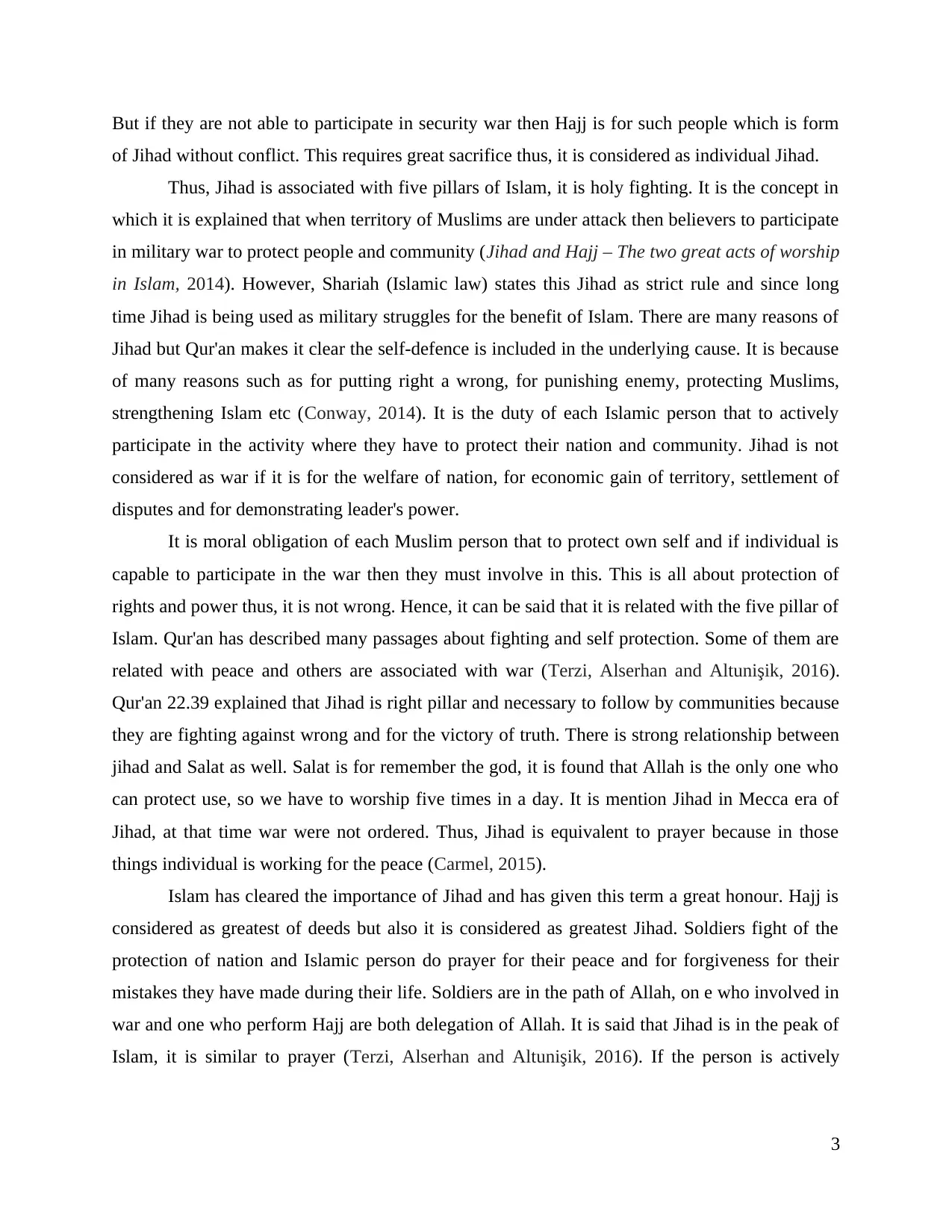
But if they are not able to participate in security war then Hajj is for such people which is form
of Jihad without conflict. This requires great sacrifice thus, it is considered as individual Jihad.
Thus, Jihad is associated with five pillars of Islam, it is holy fighting. It is the concept in
which it is explained that when territory of Muslims are under attack then believers to participate
in military war to protect people and community (Jihad and Hajj – The two great acts of worship
in Islam, 2014). However, Shariah (Islamic law) states this Jihad as strict rule and since long
time Jihad is being used as military struggles for the benefit of Islam. There are many reasons of
Jihad but Qur'an makes it clear the self-defence is included in the underlying cause. It is because
of many reasons such as for putting right a wrong, for punishing enemy, protecting Muslims,
strengthening Islam etc (Conway, 2014). It is the duty of each Islamic person that to actively
participate in the activity where they have to protect their nation and community. Jihad is not
considered as war if it is for the welfare of nation, for economic gain of territory, settlement of
disputes and for demonstrating leader's power.
It is moral obligation of each Muslim person that to protect own self and if individual is
capable to participate in the war then they must involve in this. This is all about protection of
rights and power thus, it is not wrong. Hence, it can be said that it is related with the five pillar of
Islam. Qur'an has described many passages about fighting and self protection. Some of them are
related with peace and others are associated with war (Terzi, Alserhan and Altunişik, 2016).
Qur'an 22.39 explained that Jihad is right pillar and necessary to follow by communities because
they are fighting against wrong and for the victory of truth. There is strong relationship between
jihad and Salat as well. Salat is for remember the god, it is found that Allah is the only one who
can protect use, so we have to worship five times in a day. It is mention Jihad in Mecca era of
Jihad, at that time war were not ordered. Thus, Jihad is equivalent to prayer because in those
things individual is working for the peace (Carmel, 2015).
Islam has cleared the importance of Jihad and has given this term a great honour. Hajj is
considered as greatest of deeds but also it is considered as greatest Jihad. Soldiers fight of the
protection of nation and Islamic person do prayer for their peace and for forgiveness for their
mistakes they have made during their life. Soldiers are in the path of Allah, on e who involved in
war and one who perform Hajj are both delegation of Allah. It is said that Jihad is in the peak of
Islam, it is similar to prayer (Terzi, Alserhan and Altunişik, 2016). If the person is actively
3
of Jihad without conflict. This requires great sacrifice thus, it is considered as individual Jihad.
Thus, Jihad is associated with five pillars of Islam, it is holy fighting. It is the concept in
which it is explained that when territory of Muslims are under attack then believers to participate
in military war to protect people and community (Jihad and Hajj – The two great acts of worship
in Islam, 2014). However, Shariah (Islamic law) states this Jihad as strict rule and since long
time Jihad is being used as military struggles for the benefit of Islam. There are many reasons of
Jihad but Qur'an makes it clear the self-defence is included in the underlying cause. It is because
of many reasons such as for putting right a wrong, for punishing enemy, protecting Muslims,
strengthening Islam etc (Conway, 2014). It is the duty of each Islamic person that to actively
participate in the activity where they have to protect their nation and community. Jihad is not
considered as war if it is for the welfare of nation, for economic gain of territory, settlement of
disputes and for demonstrating leader's power.
It is moral obligation of each Muslim person that to protect own self and if individual is
capable to participate in the war then they must involve in this. This is all about protection of
rights and power thus, it is not wrong. Hence, it can be said that it is related with the five pillar of
Islam. Qur'an has described many passages about fighting and self protection. Some of them are
related with peace and others are associated with war (Terzi, Alserhan and Altunişik, 2016).
Qur'an 22.39 explained that Jihad is right pillar and necessary to follow by communities because
they are fighting against wrong and for the victory of truth. There is strong relationship between
jihad and Salat as well. Salat is for remember the god, it is found that Allah is the only one who
can protect use, so we have to worship five times in a day. It is mention Jihad in Mecca era of
Jihad, at that time war were not ordered. Thus, Jihad is equivalent to prayer because in those
things individual is working for the peace (Carmel, 2015).
Islam has cleared the importance of Jihad and has given this term a great honour. Hajj is
considered as greatest of deeds but also it is considered as greatest Jihad. Soldiers fight of the
protection of nation and Islamic person do prayer for their peace and for forgiveness for their
mistakes they have made during their life. Soldiers are in the path of Allah, on e who involved in
war and one who perform Hajj are both delegation of Allah. It is said that Jihad is in the peak of
Islam, it is similar to prayer (Terzi, Alserhan and Altunişik, 2016). If the person is actively
3
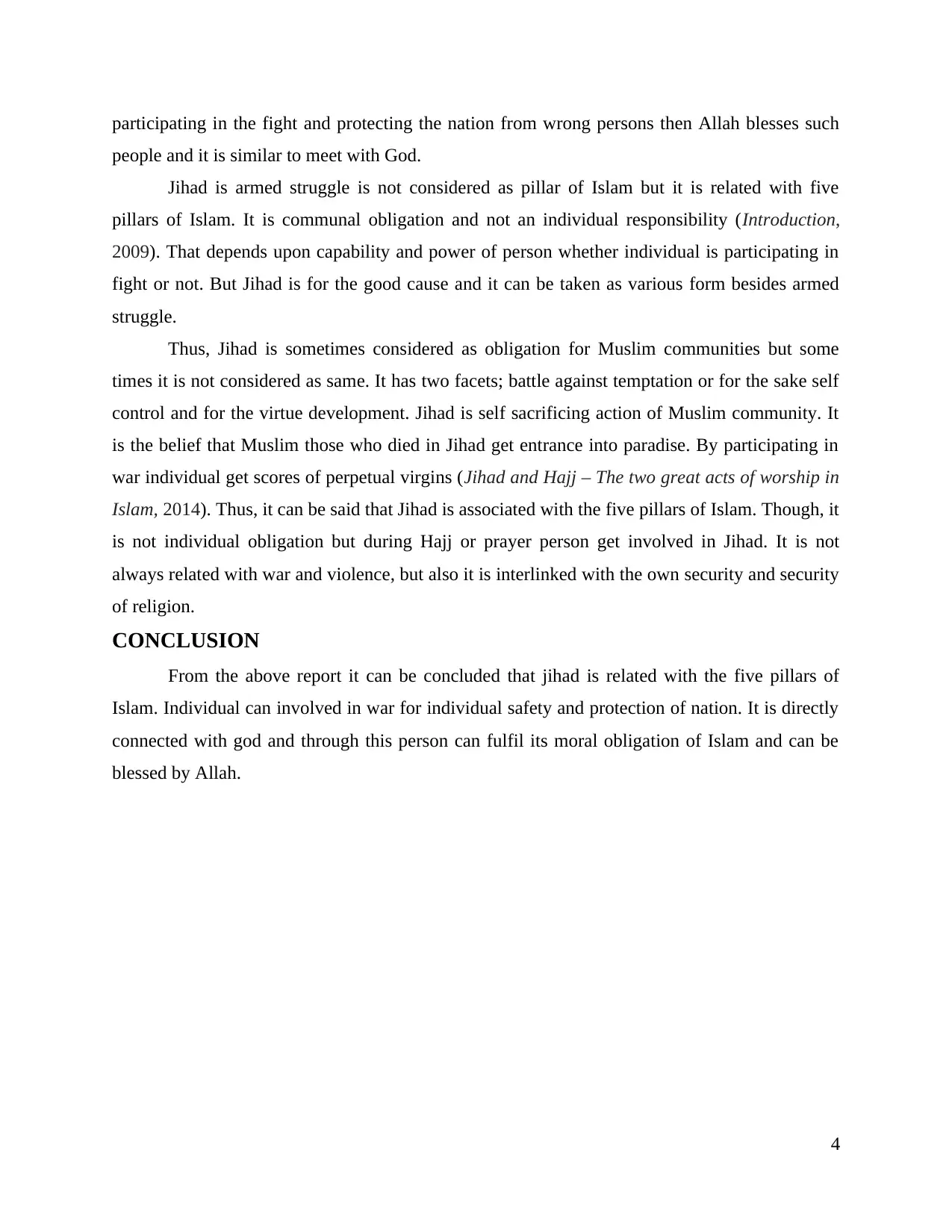
participating in the fight and protecting the nation from wrong persons then Allah blesses such
people and it is similar to meet with God.
Jihad is armed struggle is not considered as pillar of Islam but it is related with five
pillars of Islam. It is communal obligation and not an individual responsibility (Introduction,
2009). That depends upon capability and power of person whether individual is participating in
fight or not. But Jihad is for the good cause and it can be taken as various form besides armed
struggle.
Thus, Jihad is sometimes considered as obligation for Muslim communities but some
times it is not considered as same. It has two facets; battle against temptation or for the sake self
control and for the virtue development. Jihad is self sacrificing action of Muslim community. It
is the belief that Muslim those who died in Jihad get entrance into paradise. By participating in
war individual get scores of perpetual virgins (Jihad and Hajj – The two great acts of worship in
Islam, 2014). Thus, it can be said that Jihad is associated with the five pillars of Islam. Though, it
is not individual obligation but during Hajj or prayer person get involved in Jihad. It is not
always related with war and violence, but also it is interlinked with the own security and security
of religion.
CONCLUSION
From the above report it can be concluded that jihad is related with the five pillars of
Islam. Individual can involved in war for individual safety and protection of nation. It is directly
connected with god and through this person can fulfil its moral obligation of Islam and can be
blessed by Allah.
4
people and it is similar to meet with God.
Jihad is armed struggle is not considered as pillar of Islam but it is related with five
pillars of Islam. It is communal obligation and not an individual responsibility (Introduction,
2009). That depends upon capability and power of person whether individual is participating in
fight or not. But Jihad is for the good cause and it can be taken as various form besides armed
struggle.
Thus, Jihad is sometimes considered as obligation for Muslim communities but some
times it is not considered as same. It has two facets; battle against temptation or for the sake self
control and for the virtue development. Jihad is self sacrificing action of Muslim community. It
is the belief that Muslim those who died in Jihad get entrance into paradise. By participating in
war individual get scores of perpetual virgins (Jihad and Hajj – The two great acts of worship in
Islam, 2014). Thus, it can be said that Jihad is associated with the five pillars of Islam. Though, it
is not individual obligation but during Hajj or prayer person get involved in Jihad. It is not
always related with war and violence, but also it is interlinked with the own security and security
of religion.
CONCLUSION
From the above report it can be concluded that jihad is related with the five pillars of
Islam. Individual can involved in war for individual safety and protection of nation. It is directly
connected with god and through this person can fulfil its moral obligation of Islam and can be
blessed by Allah.
4
⊘ This is a preview!⊘
Do you want full access?
Subscribe today to unlock all pages.

Trusted by 1+ million students worldwide
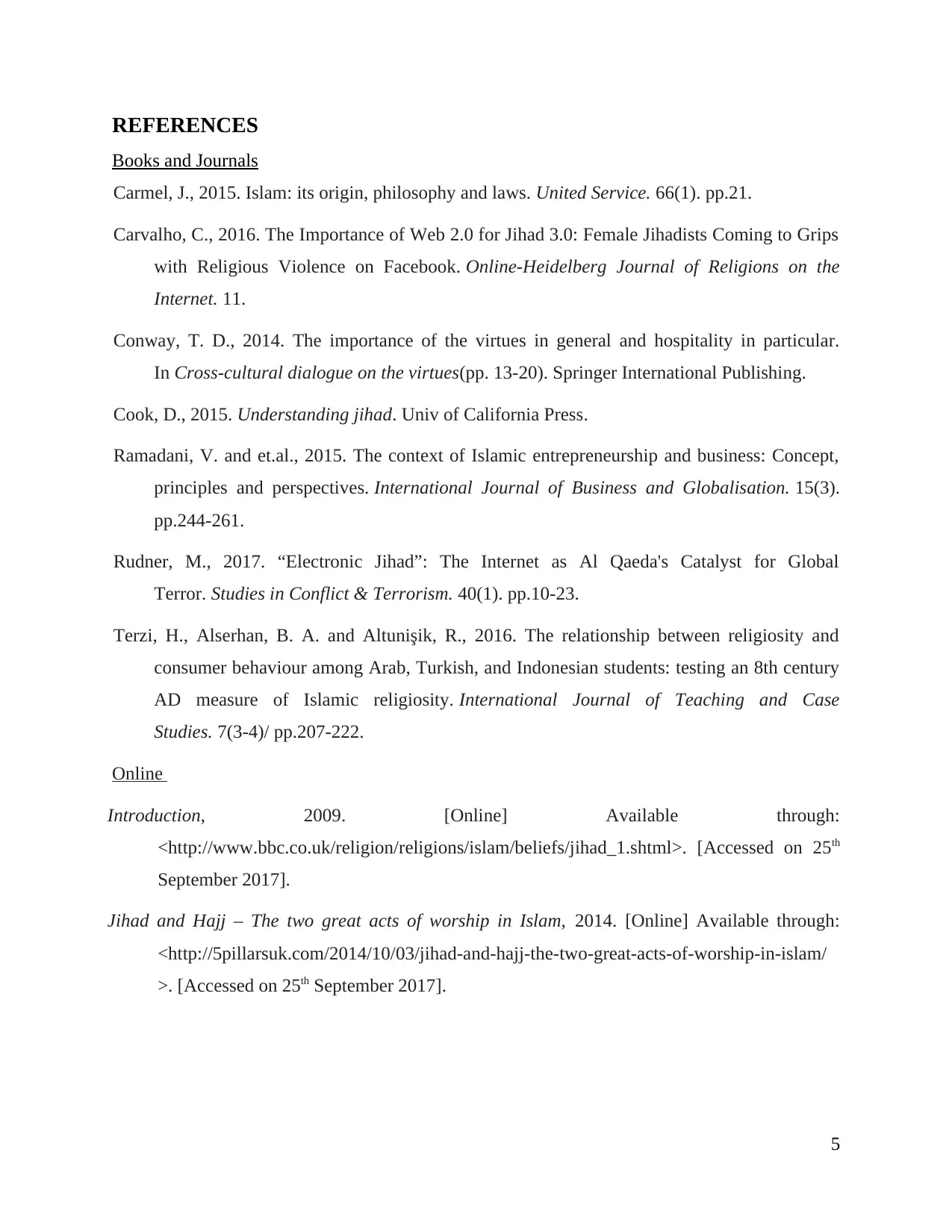
REFERENCES
Books and Journals
Carmel, J., 2015. Islam: its origin, philosophy and laws. United Service. 66(1). pp.21.
Carvalho, C., 2016. The Importance of Web 2.0 for Jihad 3.0: Female Jihadists Coming to Grips
with Religious Violence on Facebook. Online-Heidelberg Journal of Religions on the
Internet. 11.
Conway, T. D., 2014. The importance of the virtues in general and hospitality in particular.
In Cross-cultural dialogue on the virtues(pp. 13-20). Springer International Publishing.
Cook, D., 2015. Understanding jihad. Univ of California Press.
Ramadani, V. and et.al., 2015. The context of Islamic entrepreneurship and business: Concept,
principles and perspectives. International Journal of Business and Globalisation. 15(3).
pp.244-261.
Rudner, M., 2017. “Electronic Jihad”: The Internet as Al Qaeda's Catalyst for Global
Terror. Studies in Conflict & Terrorism. 40(1). pp.10-23.
Terzi, H., Alserhan, B. A. and Altunişik, R., 2016. The relationship between religiosity and
consumer behaviour among Arab, Turkish, and Indonesian students: testing an 8th century
AD measure of Islamic religiosity. International Journal of Teaching and Case
Studies. 7(3-4)/ pp.207-222.
Online
Introduction, 2009. [Online] Available through:
<http://www.bbc.co.uk/religion/religions/islam/beliefs/jihad_1.shtml>. [Accessed on 25th
September 2017].
Jihad and Hajj – The two great acts of worship in Islam, 2014. [Online] Available through:
<http://5pillarsuk.com/2014/10/03/jihad-and-hajj-the-two-great-acts-of-worship-in-islam/
>. [Accessed on 25th September 2017].
5
Books and Journals
Carmel, J., 2015. Islam: its origin, philosophy and laws. United Service. 66(1). pp.21.
Carvalho, C., 2016. The Importance of Web 2.0 for Jihad 3.0: Female Jihadists Coming to Grips
with Religious Violence on Facebook. Online-Heidelberg Journal of Religions on the
Internet. 11.
Conway, T. D., 2014. The importance of the virtues in general and hospitality in particular.
In Cross-cultural dialogue on the virtues(pp. 13-20). Springer International Publishing.
Cook, D., 2015. Understanding jihad. Univ of California Press.
Ramadani, V. and et.al., 2015. The context of Islamic entrepreneurship and business: Concept,
principles and perspectives. International Journal of Business and Globalisation. 15(3).
pp.244-261.
Rudner, M., 2017. “Electronic Jihad”: The Internet as Al Qaeda's Catalyst for Global
Terror. Studies in Conflict & Terrorism. 40(1). pp.10-23.
Terzi, H., Alserhan, B. A. and Altunişik, R., 2016. The relationship between religiosity and
consumer behaviour among Arab, Turkish, and Indonesian students: testing an 8th century
AD measure of Islamic religiosity. International Journal of Teaching and Case
Studies. 7(3-4)/ pp.207-222.
Online
Introduction, 2009. [Online] Available through:
<http://www.bbc.co.uk/religion/religions/islam/beliefs/jihad_1.shtml>. [Accessed on 25th
September 2017].
Jihad and Hajj – The two great acts of worship in Islam, 2014. [Online] Available through:
<http://5pillarsuk.com/2014/10/03/jihad-and-hajj-the-two-great-acts-of-worship-in-islam/
>. [Accessed on 25th September 2017].
5
1 out of 7
Related Documents
Your All-in-One AI-Powered Toolkit for Academic Success.
+13062052269
info@desklib.com
Available 24*7 on WhatsApp / Email
![[object Object]](/_next/static/media/star-bottom.7253800d.svg)
Unlock your academic potential
Copyright © 2020–2026 A2Z Services. All Rights Reserved. Developed and managed by ZUCOL.




